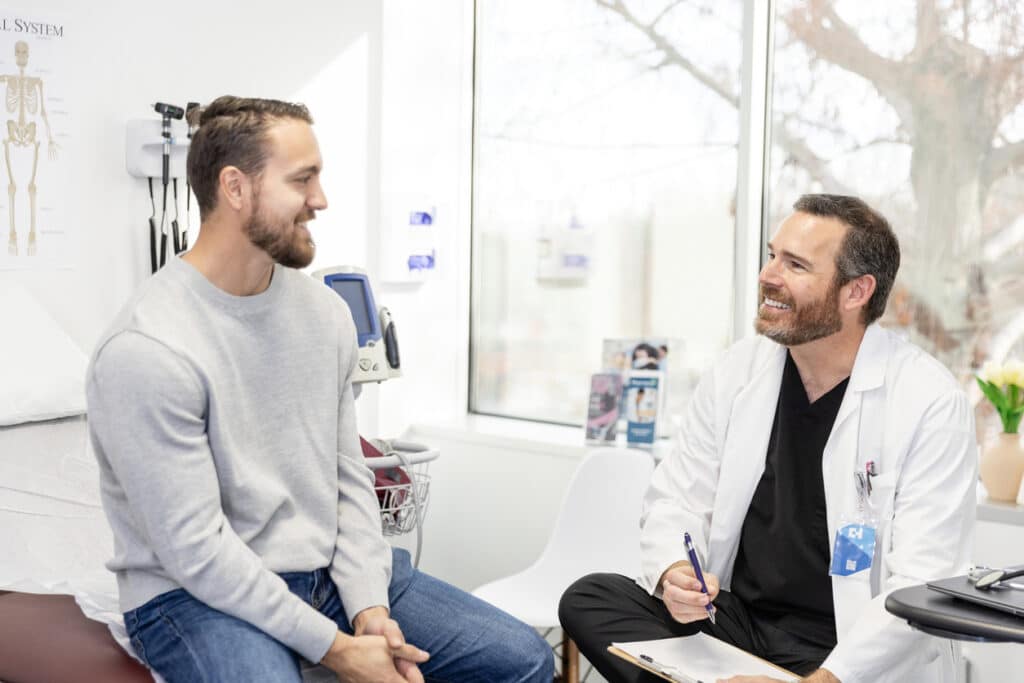As men age, decreasing testosterone levels can greatly affect physical performance, emotional well-being, and overall quality of life. Testosterone replacement therapy (TRT) presents a possible solution for men facing symptoms of low testosterone, enabling them to correct hormonal imbalances and regain vitality.
Understanding low testosterone
Testosterone, the main male hormone produced by the testicles, is essential for maintaining bone density, muscle mass, and sexual function in men. Low testosterone, also referred to as male hypogonadism or Low T, is a treatable medical condition that can lead to low libido, erectile dysfunction, increased body fat, and reduced energy levels.
Testosterone levels typically peak during adolescence and early adulthood, then gradually decline with age, generally at a rate of about 1% per year after age 30–40 (Mayo Clinic). This decline is usually due to normal aging, but in some cases, it could result from problems with the testicles or the pituitary gland that controls them.
When testosterone levels drop significantly, men may experience fewer spontaneous erections, reduced sexual desire, and changes in body composition like increased body fat and reduced muscle mass. Emotional changes can also occur, including decreased motivation, trouble concentrating, and even symptoms of depression. Essentially, it impacts the overall quality of life.
Testosterone replacement treatment (TRT) offers a potential solution for men diagnosed with clinically low testosterone levels through blood tests. This treatment, available as injections, gels, patches, or other forms, can help restore testosterone to normal levels and improve many symptoms of low testosterone.
Symptoms and diagnosis
Men experiencing low testosterone exhibit various symptoms that impact their physical health, mental well-being, and sexual function (Urology Care Foundation). Recognizing these symptoms is the first step toward proper diagnosis and treatment. Here are a few common symptoms of Low T:
- Decreased sex drive (low libido) and fewer spontaneous erections
- Erectile dysfunction and reduced sexual performance
- Low energy and persistent fatigue
- Increased body fat with decreased muscle mass
- Reduced bone density may lead to osteoporosis
- Mood changes, including irritability or depression
- Difficulty concentrating and memory problems
- Loss of body and facial hair
- Hot flashes and sleep disturbances
A proper diagnosis of testosterone deficiency requires a medical evaluation of symptoms and laboratory testing. Your medical provider will begin by discussing your medical history, current symptoms, and any medications you’re taking that might affect hormone levels. A physical exam helps identify signs of low testosterone, including changes in muscle mass, body fat distribution, and testicular size.
Blood tests provide the definitive diagnosis, with samples typically taken in the morning when testosterone levels are highest. Your medical practitioner may also order additional tests to check other hormones and rule out medical conditions with similar symptoms, such as thyroid disorders or diabetes.
Benefits and risks of TRT
Testosterone treatment offers several potential benefits for men with clinically diagnosed low testosterone. You should only begin TRT after consultation with a qualified healthcare provider.
Those potential benefits of TRT include:
- Improved energy levels and reduced fatigue
- Enhanced sex drive and better-quality erections
- Increased muscle mass and decreased body fat
- Improved mood, focus, and cognitive function
- Stronger bones and better bone density
- Better overall sense of well-being and quality of life
Despite the potential gains, there are some potential risks of TRT (National Library of Health) you should be aware of, such as:
- Increased risk of heart disease and cardiovascular events
- Potential growth of existing prostate cancer or benign prostatic hyperplasia
- Higher risk of blood clots and pulmonary embolism
- Elevated red blood cell count that may thicken blood
- Sleep apnea development or worsening
- Skin reactions from topical gels or patches
- Reduced sperm production and potential fertility issues
Weighing these benefits against the risks is essential when considering testosterone replacement therapy as a treatment option for low testosterone.

Choosing the right TRT doctor
Finding the right testosterone therapy doctor is a requirement for the safe and effective treatment of low testosterone. A specialized physician, like those at Huddle Men’s Health, can provide personalized care tailored to your specific health needs and medical history.
When selecting a TRT doctor, look for a healthcare professional with extensive experience in hormone therapy and a deep understanding of male hypogonadism. Your ideal doctor should offer comprehensive care, stay current with the latest research and treatment options, and be willing to develop a customized treatment plan that addresses your individual symptoms and health conditions.
TRT and prostate health
Prostate health is a critical factor in determining TRT eligibility and ongoing treatment. The latest studies show that there is little statistical correlation between TRT and prostate cancer. Regardless, men with a history of prostate cancer or benign prostatic hypertrophy (BPH) may face restrictions or require extensive monitoring during testosterone replacement therapy (National Library of Health).
TRT and other health conditions
Certain health conditions can significantly impact TRT treatment and patient safety. Men with sleep apnea, congestive heart failure, or a history of blood clots may require specialized evaluation and potentially face limitations in testosterone replacement therapy (National Library of Medicine).
Finding a reputable clinic
Choosing a clinic for testosterone replacement therapy requires careful research and due diligence. Look for a specialized TRT clinic with a strong reputation, verified credentials, and positive patient reviews from trusted sources.
What to expect from TRT treatment
Testosterone replacement therapy offers multiple administration methods, including injections, topical gels, and transdermal patches. Each treatment option is carefully selected based on the patient’s individual health needs, lifestyle, and specific symptoms of low testosterone.
Regular medical monitoring is a critical component of successful testosterone replacement therapy. Follow-up appointments allow your doctor to track testosterone levels, assess treatment effectiveness, and make necessary adjustments to your personalized treatment plan to ensure optimal results and minimize potential health risks.
Natural Low T treatment options
Lifestyle modifications also play a significant role in supporting healthy testosterone levels and mitigating symptoms of low T. A combination of regular resistance exercise, weight management, and targeted nutritional strategies helps boost the body’s natural hormone production.
Nutrition and a healthy diet also impact testosterone production, with some dietary approaches showing promise in supporting male hormone health. Incorporating foods rich in zinc, vitamin D, and healthy proteins while reducing processed foods and maintaining a balanced caloric intake helps improve overall hormonal balance and support muscle mass maintenance.
Conclusion
Navigating low testosterone requires a comprehensive understanding of your body’s unique hormonal landscape and a personalized approach to treatment. Men’s health is not a one-size-fits-all journey but a tailored path toward restored vitality and well-being.
Huddle Men’s Health stands ready to support you through every stage of testosterone replacement therapy. Our specialized physicians offer comprehensive, personalized care designed to help you reclaim your energy, sexual function, and overall quality of life.
Don’t let low testosterone diminish your potential. Schedule a confidential consultation with Huddle Men’s Health today and discover how our expert team can help you optimize your hormone health.
FAQs
How do I know if I need a TRT doctor?
If you experience low energy, decreased muscle mass, low libido, erectile dysfunction, or mood changes, you may have low testosterone levels. A blood test is required to confirm testosterone deficiency.
How can I get TRT from a doctor?
A TRT doctor will review your medical history, conduct a physical exam, and order blood tests. If your testosterone levels are low, they will create a personalized treatment plan with options like injections, gels, or patches.
Is testosterone replacement therapy safe?
TRT is generally safe when monitored by a qualified doctor. However, it may increase the risk of heart disease, prostate issues, and blood clots. Regular check-ups help ensure safe and effective treatment.
How long does it take for TRT to work?
Most men start noticing improvements in energy, mood, and libido within 3-6 months. Muscle growth and fat loss may take longer, depending on the treatment plan and lifestyle factors.
What are the risks of stopping TRT?
If you stop TRT suddenly, you may experience fatigue, mood swings, loss of muscle mass, and a further drop in testosterone levels. It’s important to consult your doctor before making any changes.




